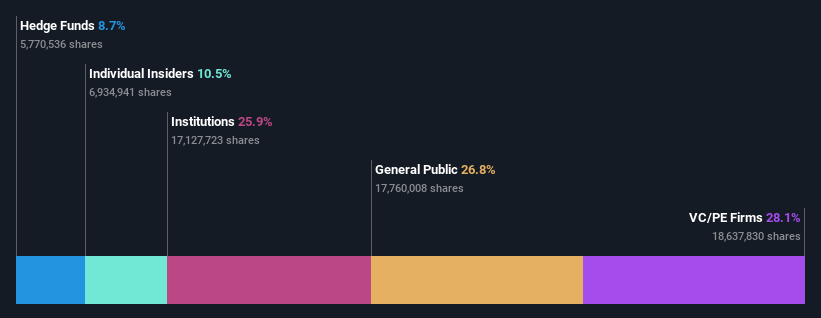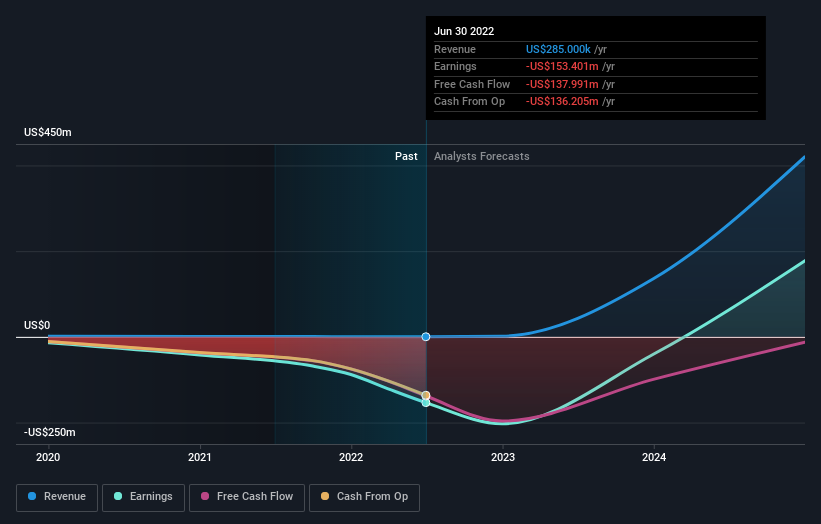Private equity firms are Amylyx Pharmaceuticals, Inc.'s (NASDAQ:AMLX) biggest owners and were rewarded after market cap rose by US$170m last week
To get a sense of who is truly in control of Amylyx Pharmaceuticals, Inc. (NASDAQ:AMLX), it is important to understand the ownership structure of the business. And the group that holds the biggest piece of the pie are private equity firms with 28% ownership. That is, the group stands to benefit the most if the stock rises (or lose the most if there is a downturn).
As a result, private equity firms collectively scored the highest last week as the company hit US$2.3b market cap following a 6.4% gain in the stock.
Let's take a closer look to see what the different types of shareholders can tell us about Amylyx Pharmaceuticals.
View our latest analysis for Amylyx Pharmaceuticals
What Does The Institutional Ownership Tell Us About Amylyx Pharmaceuticals?
Institutions typically measure themselves against a benchmark when reporting to their own investors, so they often become more enthusiastic about a stock once it's included in a major index. We would expect most companies to have some institutions on the register, especially if they are growing.
We can see that Amylyx Pharmaceuticals does have institutional investors; and they hold a good portion of the company's stock. This suggests some credibility amongst professional investors. But we can't rely on that fact alone since institutions make bad investments sometimes, just like everyone does. When multiple institutions own a stock, there's always a risk that they are in a 'crowded trade'. When such a trade goes wrong, multiple parties may compete to sell stock fast. This risk is higher in a company without a history of growth. You can see Amylyx Pharmaceuticals' historic earnings and revenue below, but keep in mind there's always more to the story.
It would appear that 8.7% of Amylyx Pharmaceuticals shares are controlled by hedge funds. That worth noting, since hedge funds are often quite active investors, who may try to influence management. Many want to see value creation (and a higher share price) in the short term or medium term. The company's largest shareholder is The Morningside Group Limited, with ownership of 14%. The second and third largest shareholders are ALS Investment Fund and Viking Global Investors LP, with an equal amount of shares to their name at 8.8%. In addition, we found that Joshua Cohen, the CEO has 4.3% of the shares allocated to their name.
We did some more digging and found that 8 of the top shareholders account for roughly 52% of the register, implying that along with larger shareholders, there are a few smaller shareholders, thereby balancing out each others interests somewhat.
While it makes sense to study institutional ownership data for a company, it also makes sense to study analyst sentiments to know which way the wind is blowing. Quite a few analysts cover the stock, so you could look into forecast growth quite easily.
Insider Ownership Of Amylyx Pharmaceuticals
The definition of an insider can differ slightly between different countries, but members of the board of directors always count. The company management answer to the board and the latter should represent the interests of shareholders. Notably, sometimes top-level managers are on the board themselves.
I generally consider insider ownership to be a good thing. However, on some occasions it makes it more difficult for other shareholders to hold the board accountable for decisions.
Our most recent data indicates that insiders own a reasonable proportion of Amylyx Pharmaceuticals, Inc.. It has a market capitalization of just US$2.3b, and insiders have US$240m worth of shares in their own names. That's quite significant. Most would be pleased to see the board is investing alongside them. You may wish to access this free chart showing recent trading by insiders.
General Public Ownership
With a 27% ownership, the general public, mostly comprising of individual investors, have some degree of sway over Amylyx Pharmaceuticals. While this size of ownership may not be enough to sway a policy decision in their favour, they can still make a collective impact on company policies.
Private Equity Ownership
Private equity firms hold a 28% stake in Amylyx Pharmaceuticals. This suggests they can be influential in key policy decisions. Sometimes we see private equity stick around for the long term, but generally speaking they have a shorter investment horizon and -- as the name suggests -- don't invest in public companies much. After some time they may look to sell and redeploy capital elsewhere.
Next Steps:
I find it very interesting to look at who exactly owns a company. But to truly gain insight, we need to consider other information, too. For example, we've discovered 2 warning signs for Amylyx Pharmaceuticals that you should be aware of before investing here.
But ultimately it is the future, not the past, that will determine how well the owners of this business will do. Therefore we think it advisable to take a look at this free report showing whether analysts are predicting a brighter future.
NB: Figures in this article are calculated using data from the last twelve months, which refer to the 12-month period ending on the last date of the month the financial statement is dated. This may not be consistent with full year annual report figures.
Have feedback on this article? Concerned about the content? Get in touch with us directly. Alternatively, email editorial-team (at) simplywallst.com.
This article by Simply Wall St is general in nature. We provide commentary based on historical data and analyst forecasts only using an unbiased methodology and our articles are not intended to be financial advice. It does not constitute a recommendation to buy or sell any stock, and does not take account of your objectives, or your financial situation. We aim to bring you long-term focused analysis driven by fundamental data. Note that our analysis may not factor in the latest price-sensitive company announcements or qualitative material. Simply Wall St has no position in any stocks mentioned.
Join A Paid User Research Session
You’ll receive a US$30 Amazon Gift card for 1 hour of your time while helping us build better investing tools for the individual investors like yourself. Sign up here

 Yahoo Finance
Yahoo Finance 

